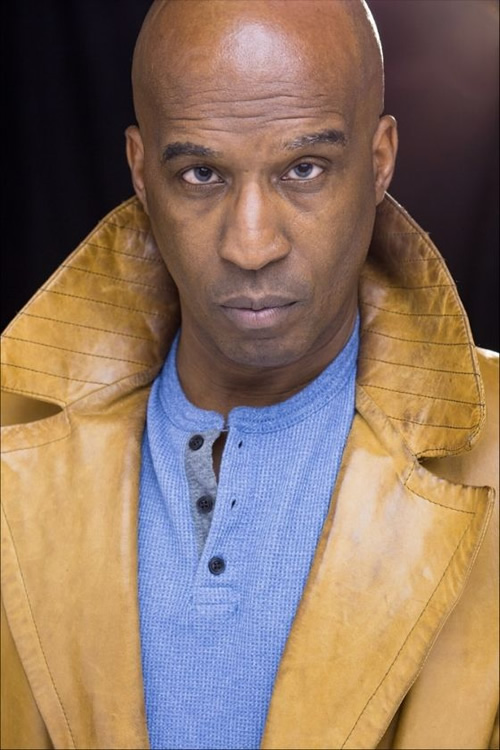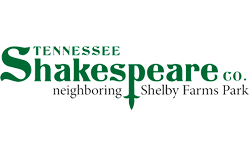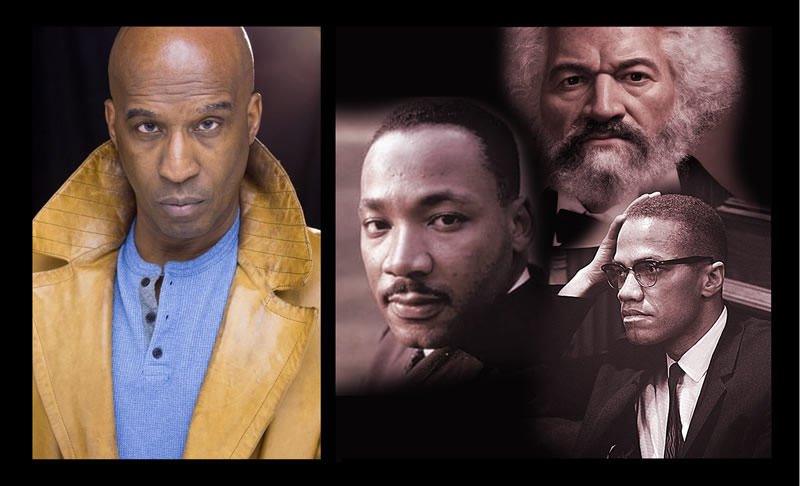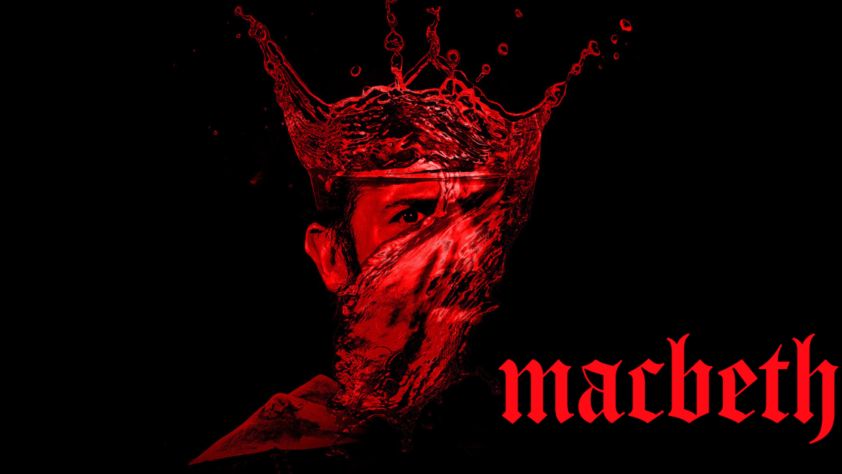In-Person and Online Friday, September 11 at 8:00 pm (CDT)
We continue our “Essential” 13th performance season on Friday, September 11 with the second of nine Dr. Greta McCormick Coger Literary Salons titled Creative Extremists: Dr. Martin Luther King, Jr., Frederick Douglass, and Malcolm X.
The 45-minute Salon, presented both in-person on TSC’s Owen and Margaret Wellford Tabor Stage and simulcast online beginning at 8:00 pm (CDT), creatively follows the inspirations, emergence, and actions of three men fighting for racial justice and equality in America.
Curated and performed by TSC founding member Darius Wallace and directed by Producing Artistic Director Dan McCleary, Creative Extremists reminds us that while our democracy remains imperfect, it does provide for basic human rights for everyone. Dr. King, Douglass, and Malcolm X exercised those rights in different ways and were inspired by writers who came before them. They remain particularly influential today in a deadly, racially-divided country.

Wallace, a native of Flint, Michigan, has traveled the country for most of his life performing solo shows as King, Douglass, and Malcolm X, along with the poetry of Langston Hughes. In this Salon, he combines the words and lives of the three men along with his own personal experience and poetry to reflect on this year’s violence and protests within our African-American community.
The Salon will include, among several works, Dr. King’s resonant letter from a Birmingham jail in 1963, the direct-action speeches of Malcolm X, and the illuminating correspondence of Douglass while in forced exile from his own country.
“What I have learned from playing these is the power of curiosity,” says Wallace. “Their desire for growth and personal development created a stronger desire for growth and personal development within the African-American people, who for centuries have been ridiculed, beaten, and killed in the pursuit of these virtues. Their voices are important now because they convict three entities that have consistently divided us throughout our country’s history: the Press, the Pulpit, and the Platform. The Press, as it relates to conservative and liberal media. The Platform, as it relates to our political parties. The pulpit, as it relates to organized religions that regularly act to condemn and that use their followers to support parties that encourage discrimination based on race, nationality, and culture.
“The ability of these men to transform themselves through the power of the written and spoken word gives us hope – and hope for future generations. They give us hope that through the power of the written and spoken word we can transform our lives and manifest our destiny.”
Wallace’s theatre credits include Michigan Shakespeare Festival, Flint Youth Theater, Attic Theater, and Hattiloo Theater. He is currently a company member of Playhouse on the Square and Voices of the South. His movie and TV credits include Nothing but the Truth, Brian Banks, The World We Make, ABC’s Nashville, NBC’s Bluff City Law, and The Hallmark Channel’s Wedding At Graceland. He directed his own movie, 100 Lives, which is available on Amazon. He has worked as a speaking coach with Commercial Advisors, Nucor Steele, Sycamore Pictures, and TEDx Memphis.
The Salon’s title is taken partially from an excerpt from Dr. King’s Birmingham edited jail letter:
“We know through painful experience that freedom is never voluntarily given by the oppressor; it must be demanded by the oppressed. Frankly, I have yet to engage in a direct action campaign that was ‘well-timed’ in the view of those who have not suffered unduly from the disease of segregation. For years now I have heard the word ‘Wait!’ It rings in the ear of every Negro with piercing familiarity. This ‘Wait’ has almost always meant ‘Never.’ We must come to see, with one of our distinguished jurists, that ‘justice too long delayed is justice denied’.”
“Was not Jesus an extremist for love: ‘Love your enemies, bless them that curse you, do good to them that hate you, and pray for them which despitefully use you, and persecute you.’ And Abraham Lincoln: ‘This nation cannot survive half slave and half free.’ And Thomas Jefferson: ‘We hold these truths to be self evident, that all men are created equal . . .’ So the question is not whether we will be extremists, but what kind of extremists we will be.
“Will we be extremists for hate or for love? Will we be extremists for the preservation of injustice or for the extension of justice? Perhaps the South, the nation and the world are in dire need of creative extremists.”
Box Office
Purchase tickets online at www.tnshakespeare.org or by calling (901) 759-0604 Monday-Friday from 9:00 am – 5:00 pm. The Salon will be available to patrons as both an in-person and digital online experience.
Online option:
The online presentation will show only once via a one-camera setup on TSC’s website with a time-stamped, specific password provided to patrons on the day of the Salon. The digital waiting room opens 15 minutes prior to curtain. All digital online tickets are $15.
In-person option:
In-person seating at the Tabor Stage is strictly limited to 54 socially-distanced patrons. Face coverings must be worn. Patrons must answer basic health screening positively and provide contact information prior to theatre entry. Patrons may select the preferred seating section, and TSC will then select socially-distanced seats based on the party’s size and the order in which tickets were purchased.
Tickets in Seating Section One are $25 in-person (Students $18/Seniors $22). Tickets in Seating Sections Two and Three are $18 in-person (Students $15/Seniors $18). Tickets must be purchased in advance of the Salon (not at the door), printed, and brought with patrons to the theatre. The house will open 30 minutes prior to curtain.
Credit Card charges require a $1 per-ticket fee. Schedule subject to change with notice. Free parking at TSC. There are no refunds/exchanges.
Season 13 Sponsors and Partners
TSC’s generous sponsors and partners of its season, productions, and Education and Outreach Program include International Paper, ArtsMemphis, Tennessee Arts Commission, the National Endowment for the Arts and Arts Midwest, First Horizon Foundation through an ArtsFirst grant, Community Foundation of Greater Memphis, Independent Bank, Evans|Petree, P.C., Campbell Clinic, the family of Pat and Ernest Kelly, The Sims Family Foundation, Nancy R. Copp, the family of Owen and Margaret Wellford Tabor, Dr. Greta McCormick Coger, the Barbara B. Apperson Angel Fund, the Dunbar Abston Fund for Sustainable Excellence, University of Memphis’ Department of Theatre & Dance, Shelby County Schools, Collierville Municipal School District, Memphis Juvenile Justice System, the Memphis V.A. Hospital, and the Benjamin Hooks Library Friends. TSC’s season is funded under a Grant Contract with the State of Tennessee.
About Tennessee Shakespeare Company
Tennessee Shakespeare Company is a professional, not-for-profit theatre and education organization in Memphis dedicated to live, diverse performances of William Shakespeare’s plays, as well as works of social significance by classical, Southern, and modern writers/composers; and to providing innovative educational and training programming in-person and online.
Founded in 2008 by Producing Artistic Director Dan McCleary, Tennessee Shakespeare Company is Memphis’ first and only professional, classical theatre. In 2017, TSC purchased its first performing arts facility, which is being renovated into the state’s only permanent home for professional, year-round Shakespeare performance, education, and training. The company is in the midst of its $6.5 million Brave New World capital campaign.
TSC has engaged its community with 47 site-specific plays and events for over 50,000 patrons. Its ground-breaking Education Program has reached 120 schools across nine states, totaling over 250,000 student interactions. The Program has achieved a high regional and national profile, partners annually with most local school systems, and for the second consecutive year is one of just seven U.S. theatres to be awarded a National Endowment for the Arts/Arts Midwest’s Shakespeare in American Communities Juvenile Justice grant for expanded residencies with local incarcerated youth.
The Education Program this year is launching its inaugural Online Academy, a digital catalogue of nearly 50 online courses, classes, playshops, residencies, and performances for students in K-12, for college students, and for adult learners. Taught entirely by TSC’s Teaching-Artists, the Academy provides a hybrid of live and pre-recorded classical educational opportunities at affordable rates that feature interactivity, dynamism, inquiry, and joy for all learners.



